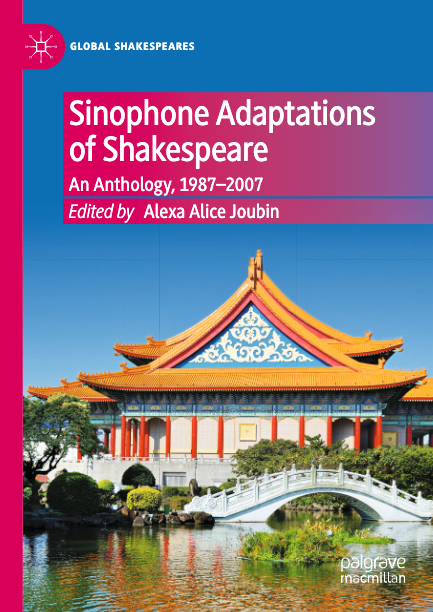Sinophone Adaptations of Shakespeare:
An Anthology, 1987-2007
Palgrave, 2022; book series: Global Shakespeare; DOI 10.1007/978-3-030-92993-0; ISBN 978-3-030-92993-0
Illustrated excerpt from the book with video clips
Table of Contents
- Sinophone Shakespeares: A Critical Introduction, Alexa Alice Joubin
Part 1. Existentialist Questions in Post-Socialist China and Post-Martial-Law Taiwan
Chapter 2. Hamlet as Political Theatre in Beijing, 1990, Steven L. Riep and Ronald Kimmons
Chapter 3. Hamlet as Parody in Taipei, 1992 / 2008, Christopher Rea and Alexa Alice Joubin
Part 2. Bewitched by Kunqu Opera and Avant-Garde Theatre
Chapter 4. An Operatic Macbeth in Shanghai, 1987 / 2008, Siyuan Liu and Alexa Alice Joubin
Chapter 5. A Feminist Macbeth in Tainan, 2007, Yilin Chen
Part 3. Self-Identities in Traditional and Experimental Jingju Opera
Chapter 6. A Confucian King Lear in Shanghai, 1995, Dongshin Chang and Alexa Alice Joubin
Chapter 7. A Buddhist King Lear in Taipei, 2001, Alexa Alice Joubin
Coda
Chapter 8. Theatrical Bricolage of Hamlet, King Lear, Macbeth, and Othello in Beijing, 1986, Lia Wen-ching Liang
Can you imagine Hamlet as a comedy, Macbeth as a feminist play, or King Lear as Buddhist meditation?
Shakespeare’s Hamlet, Macbeth, and King Lear, three of the most frequently adapted tragedies, have inspired incredible work in the Sinophone theatres of Hong Kong, Taiwan, and China for over two centuries as political theatre, comedic parody, Chinese opera, and avant-garde theatre. Gender roles in the plays take on new meanings when they are embodied by actors whose new accents expand the characters’ racial identities.
Read an illustrated excerpt with video clips.
Each of this book’s three sections offers contrasting adaptations of each tragedy for comparative analysis. This anthology showcases the directors’ methodic transformations of both Shakespeare and Sinophone performance traditions. Organized thematically to address the cultural exigencies between 1987 and 2007, this collection of translated plays showcases some gems of Sinophone cultures that stand at the intersection of East Asian and Anglophone dramas.
Between 1987, when Chairman Deng Xiaoping reaffirmed “socialist market economy” as the guiding principle of China’s development and when Taiwan’s martial law was lifted by President Chiang Ching-kuo, and 2007, when the first competitive Chief Executive election changed Hong Kong’s political culture (Donald Tsang was elected), these three tragedies were staged in multiple traditional and modern performance genres. They were informed by the anxieties and cultural dynamics in China, Hong Kong, and Taiwan during this period. The year of 1987 was the beginning of the internationalization of Sinophone Shakespeare. The multinational technology company Huawei was founded in 1987, a landmark event in terms of China’s rise internationally.
Alexa Alice Joubin’s regional method of cultural studies features a built-in comparative perspective that amplifies what Rita Felski and Susan Stanford Friedman calls “a relational mode of thinking.” This method transcends siloed, national perspectives on the development of performance cultures.
A regional methodology attends to intra-regional idiosyncrasies and connections by breaking down perceived, clear cultural boundaries between nation-states. In this model of regional studies, there are no singular, unitary centers and peripheries in the cultural exchange, because the diffuse nature of disseminating ideas on varied but connected cultural terrains enables us to have a more comprehensive vision of artists’ claimed affinity with, indifference to, and resistance of Shakespeare and the idea of Chineseness.
In fact, while the “Sinophone” may be a discrete aesthetic or linguistic unit, it has no official geographical borders. The Sinophone encompasses artistic creation in Mandarin and a wide range of Sinetic dialects and practices. Using the region as a unit of knowledge helps us transcend “local” exceptionalism.
This book shows that positivist and antithetical strands co-exist in the Sinophone reception of Shakespeare. Relational, cultural meanings emerge through negation of and negotiation with Shakespeare.
MCLC: Modern Chinese Literature and Culture 2024 (PDF)
“The anthology remedies a problem in both Sinophone studies and Shakespeare scholarship: the scarce availability of primary research materials on East Asian adaptations of Western classics. One of the main contributions of the anthology is its use of the concept of the Sinophone to deconstruct the Western-centric focus of Shakespeare scholarship.”
The Shakespearean International Yearbook (2024) review [PDF]
Roderick Hugh McKeown writes that the book “is an ambitious collection, with at least three interwoven critical projects. Her choice to curate a specifically regional approach to the topic is intended to break down the silos created by narrowly defined national Shakespeares” and also to dislodge the conception of China as a homeland in a settler colonial mentality, using the term Sinophone as a more inclusive notion that points to a network of cultures.”
Chinese Literature and Thought Today 55.1-2 (2024) (PDF)
“Sinophone Adaptations of Shakespeare, edited and translated by Alexa Alice Joubin, is a groundbreaking collection that sheds a new light on the complex connections and interactions between Shakespearean tragedy and Sinophone culture. The book offers English translations of seven Taiwanese and Mandarin Chinese scripts for theatrical adaptations of Hamlet, Macbeth, and King Lear in several genres, including spoken drama, Kunqu opera, avant-garde theatre, and Jingju Opera. These adaptations originate from various regions across China, Hong Kong, and Taiwan. This book paves a new path for Sinophone studies by comparatively analyzing seven historic yet hitherto inaccessible plays.”
